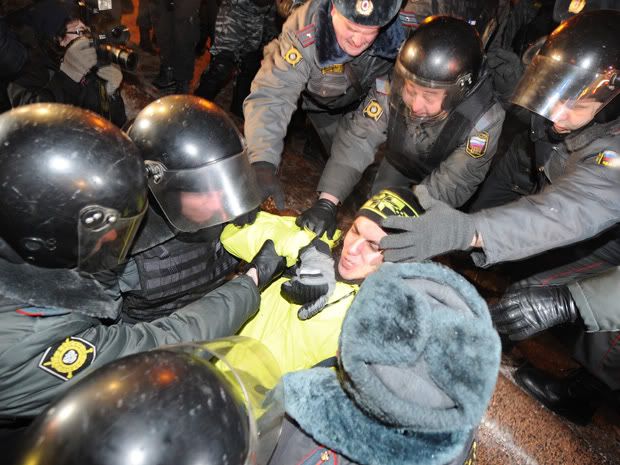
For the past three months, anti-Putin protests organized by a loose coalition of artists, authors, bloggers, and other members of the urban intelligentsia have raged in the streets of Moscow and St. Petersburg. But now Russian activists are facing the same issues dogging many Occupy Wall Street protesters, namely how to keep up the momentum and generate sustained interest in the movement.
“The romantic, euphoric phase is over: People have understood that armed with just white balloons and white ribbons … you can’t go up against robots from the OMON (riot police),” said novelist Grigory Chkhartishvili, one of the organizers who writes under the name of Boris Akunin.
“Now there will be some kind of public stupor,” Chkhartishvili insists.
Katya Soldak outlines some important differences between the Russian uprising and Occupy Wall Street. Russian activists have a focused agenda: to reform elections so they’re honest and not Kabuki theatre in which Putin feigns concern that he might not win yet another election.
Soldak notes that several strong political leaders (the Russian billionaire and owner of the New Jersey Nets, Mikhail Prokhorov, and Alexei Navalny, a blogger, for example) are involved in the anti-Putin protests, giving the two already savvy leaders a chance to ferment and evolve into even more powerful figures.
Soldak insists Russian activists’ strength will be if they allow a leader to emerge from the movement (I personally disagree with that assessment, and believe one of Occupy’s most brilliant moves was in not electing leadership).
Part of the problem of electing a movement leader is protesters automatically shoulder all of the baggage that comes along with that individual. For example, Prokhorov’s wealth was amassed not merely with entrepreneurial grit, but via sweetheart deals with the Kremlin.
In 1995, Prokhorov and [partner Vladimir] Potanin’s bank won the equivalent of the Russian lottery: Kremlin leaders gave them what amounted to an insider’s opportunity to buy one of the state’s most valuable assets - a huge mining and metal operation called Norilsk Nickel, which is among the world’s largest producers of nickel, copper and platinum.
They acquired it from the Kremlin in a so-called auction for the measly sum of a few hundred million dollars, in a process that even Prokhorov’s business partner admitted wasn’t perfect and probably not even legal under western standards. But it was legal in Russia.n 1995, Prokhorov and [partner Vladimir] Potanin’s bank won the equivalent of the Russian lottery: Kremlin leaders gave them what amounted to an insider’s opportunity to buy one of the state’s most valuable assets - a huge mining and metal operation called Norilsk Nickel, which is among the world’s largest producers of nickel, copper and platinum.They acquired it from the Kremlin in a so-called auction for the measly sum of a few hundred million dollars, in a process that even Prokhorov’s business partner admitted wasn’t perfect and probably not even legal under western standards. But it was legal in Russia.
Rolling Stone’s Matt Taibbi, who worked as a journalist for years in Russia, could barely contain his amazement about the soft touch approach implemented by the U.S. press in response to Prokhorov ‘s glorious arrival to the east coast.
The chain of events that led to Prokhorov winding up on our shores is both hilarious and totally representative of the Russian oligarch class. In Russia a key part of becoming stinking rich is shipping your profits overseas and buying a high-profile entree into Western society, so that you can show the suckers back home how much you’ve podnyalsya, or “risen up.” The same way practically all NBA stars eventually buy tricked-out Escalads and gated mansions with swimming pools and home theaters. Russian oligarchs almost always end up buying Western vanity projects. That’s why fellow Siberian billionaire Roman Abramovich bought the Chelsea soccer team.
One has to wonder about the motives of someone like Prokhorov. Is he a true reform ally, or is he hoping to create breathing room in a system so he can one day run the country and create even more luxurious business opportunities for himself and his friends? (photo by Kirill Kudryavtsev/Getty)

Perhaps reading the writing on the wall, Putin recently said he is entertaining the possibility of Prokhorov, a former presidential rival, joining the new government in some capacity.
Putin described Prokhorov as “a serious person, good entrepreneur and, in principle, could be welcome in the cabinet if he wishes that for himself.”
There are reports that the election results caused heated arguments among White House officials with some members of the Obama administration insisting the president should condemn the results. Ultimately (and unsurprisingly), the White House opted for the moderate approach and abstained from both a direct denunciation and congratulations for Putin. The tepid response may have something to do with the fact that Obama will have to see Putin soon at the G8 summit, newly relocated to Camp David.
Obama said the G8 will give him “a chance to spend time with Mr. Putin, the new Russian president.”
Meanwhile, hundreds of protesters have been arrested and police are accused of widespread violence, including beating protesters over the head with batons. The surge in police brutality prompted one prominent Russian activist to declare the era of peaceful rallies and marches is over.
“Fear of his own people, the animal fear of losing power, and a reliance on the police baton – this is what we are seeing,” Boris Nemtsov, a liberal opposition leader, wrote in a blog.
Novelist Boris Akunin, who has helped organize the protests, said he no longer believed the next rally – planned for Saturday – could pass off without trouble.
“It is absolutely clear that the period of peaceful rallies and marches is over. I see no need to organize any march on March 10 because it will lead to a clear display of aggression by the authorities,” he said.




